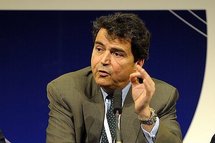Med water conference ends in failure due to Israel-Arab row
Pierre Ausseill
BARCELONA, Pierre Ausseill - Talks aimed at adopting a water management strategy for the Mediterranean failed Tuesday due to a row between Israel and Arab countries over a reference to the Palestinian territories, participants said.
The stalemate was seen as a strong blow against the nascent 43-nation Mediterranean Union, which was set up two years ago to foster cooperation in one of the world's most volatile regions.

French secretary of state for European affairs Pierre Lellouche
The conference aimed to reach an agreement on a strategy for managing fresh water in the Mediterranean to ensure equal access to the non-renewable resource and prevent the issue from becoming a source of conflict in the future.
But a reference to "occupied territories" in a proposed draft text prevented the approval of a final accord event though delegates were in agreement on 99 percent of the technical issues related to water management", said Lellouche.
Israel disagreed with this wording while Arab nations opposed to the alternative formulation of "territories under occupation" proposed by European participants, he added.
The head of the body, Jordan's Ahmad Masa'deh, said he was saddened by the failure to reach an agreement at the conference because it "casts doubt on the future of the Mediterranean Union."
The union groups all 27 EU member states with countries in North Africa, the Balkans, the Arab world as well as Israel in a bid to foster cooperation in the region.
It was established in 2008 in Paris by France and Egypt but was temporarily mothballed in early 2009 because of tensions caused by Israel's offensive against Hamas in the Gaza Strip.
"My disappointment is matched only by my hope, this structure is irreversible," said Lellouche, adding the body is a "fundamental project for peace in this region and it has not lost any validity".
Israeli Infrastructure Minister Uzi Landau rejected responsibility for the failure of the talks and blamed Arab nations instead.
"We wanted to concentrate solely on the problems of water and avoid entering into political themes. But Arab League nations lapsed into pure propaganda and made political declarations against the state of Israel," he said.
"They decided to obstruct the meeting," he added.
The issue of access to water is of crucial importance for the inhabitants of the Mediterranean basin.
Some 290 million people in the region could lack water by 2025 due to the combined effects of population growth, rising needs of agriculture, industry and tourism and global warming, according to the United Nations.
Over 180 million people in the region already lack water and over 60 million people face chronic shortages, according to Mediterranean Union experts.
Water management is a major source of tension between Israelis and Palestinians.
Israel largely controls joint water resources and supplies most of the water consumed in the West Bank.
International organisations say Israel's water supplies fall short of Palestinian needs, but also that the Palestinians have failed to set up the infrastructure and institutions needed in the water sector.
---------------------------------------------------------------------------------